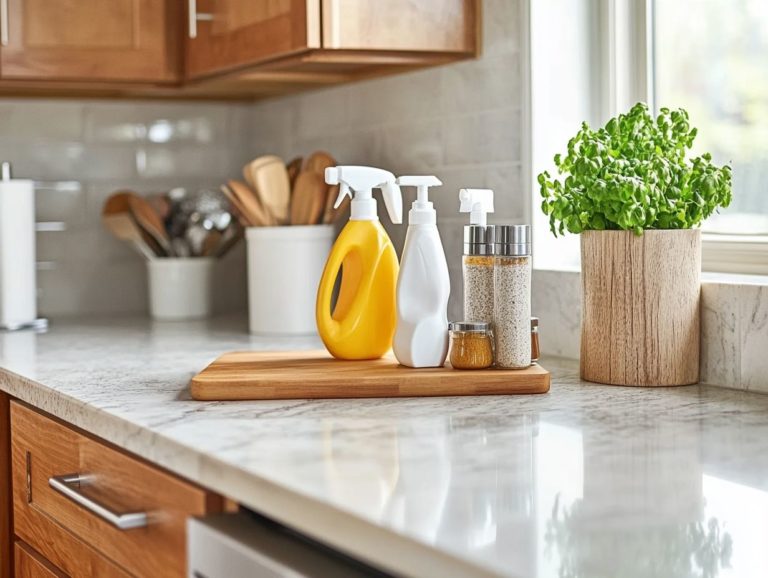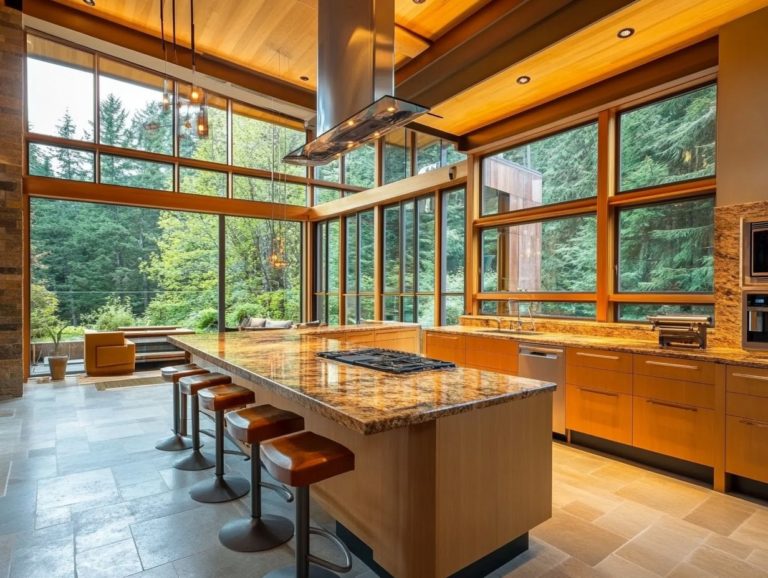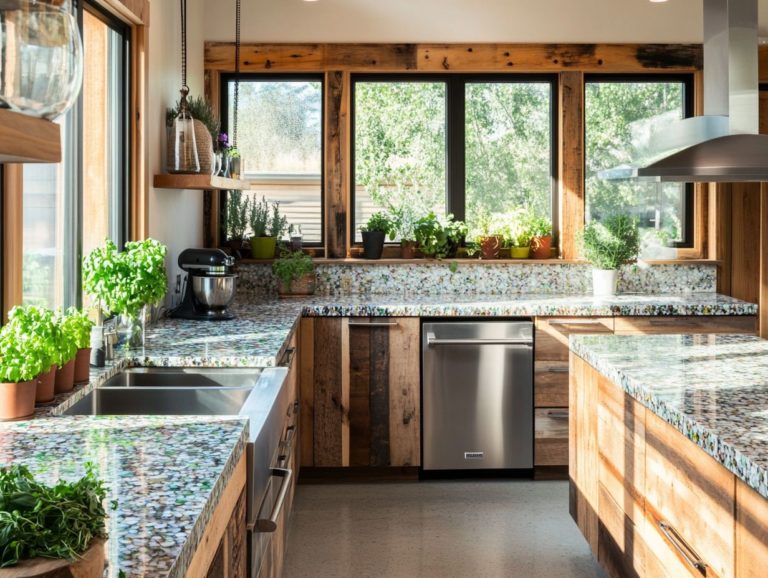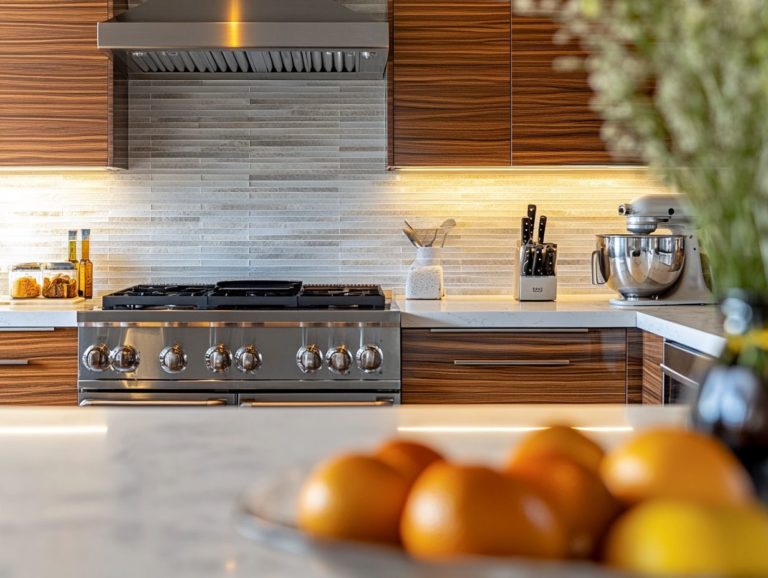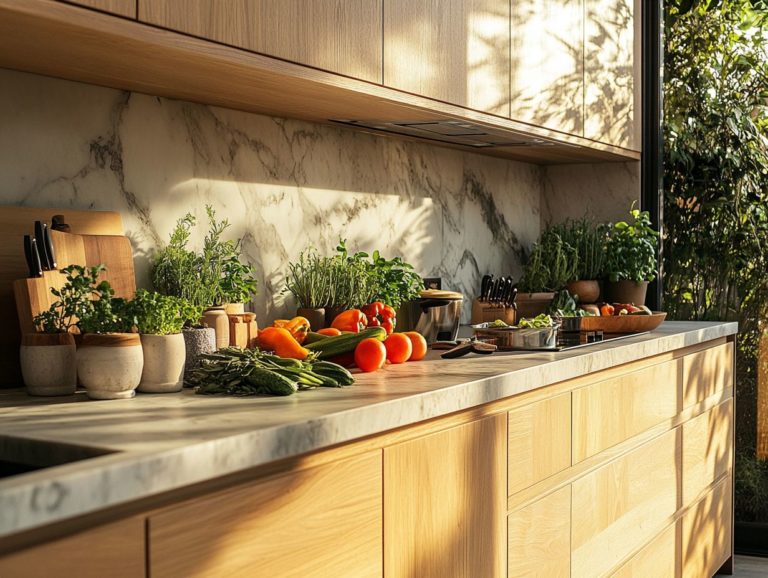Smart Materials for a High-Tech Kitchen
Imagine stepping into a kitchen that not only exudes elegance but also operates with remarkable efficiency just for you.
Smart materials are changing traditional cooking spaces, transforming them into high-tech sanctuaries of convenience and effectiveness. With features like self-cleaning surfaces and energy-efficient appliances, these groundbreaking materials offer a myriad of advantages that can save you both time and money.
This article delves into the benefits of integrating smart materials into your kitchen. It provides practical tips for seamless incorporation and explores the thrilling future of kitchen technology. Get ready to elevate your culinary experience!
Contents
- Key Takeaways:
- What are Smart Materials?
- Benefits of Using Smart Materials in the Kitchen
- Examples of Smart Materials in the Kitchen
- How to Incorporate Smart Materials in Your Kitchen
- Future of Smart Materials in the Kitchen
- Frequently Asked Questions
- What are smart materials and how are they used in a high-tech kitchen?
- What are the benefits of using smart materials in a high-tech kitchen?
- What types of smart materials are commonly used in a high-tech kitchen?
- How do shape memory alloys work in a high-tech kitchen?
- Can smart materials be used to improve food safety in a high-tech kitchen?
- Are there any disadvantages to using smart materials in a high-tech kitchen?
Key Takeaways:
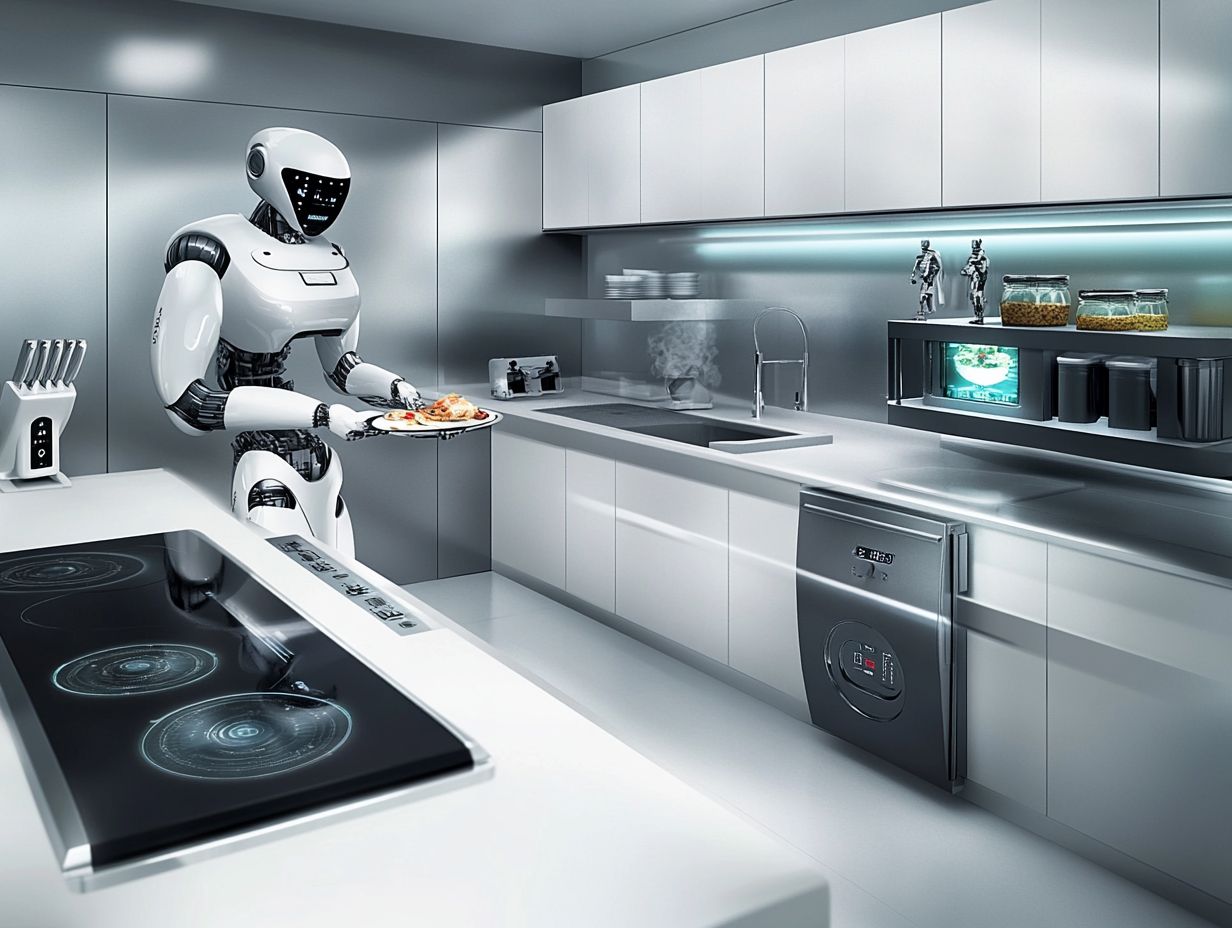
Transform your kitchen into a high-tech haven with the use of smart materials, which offer efficiency, convenience, and cost savings. From self-cleaning surfaces to energy-efficient appliances, smart materials can revolutionize daily tasks and decrease utility bills.
Incorporating smart materials in your kitchen is easy with practical tips and considerations. The future of these materials promises even more advancements and potential impacts on daily life.
What are Smart Materials?
Smart materials embody a revolutionary approach to modern kitchen design. They seamlessly integrate advanced cooking technology and energy management solutions tailored for the high-tech kitchen environment.
These materials are designed to adapt to environmental changes and user interactions. They significantly enhance both the functionality and aesthetic appeal of your kitchen space.
By effortlessly connecting with smart devices connected to the internet, they create a more cohesive and connected culinary experience.
By embracing smart materials, you can elevate your culinary skills and efficiency in food preparation, ultimately transforming your cooking experience into something truly enjoyable.
Benefits of Using Smart Materials in the Kitchen
The advantages of incorporating smart materials into your kitchen go far beyond mere aesthetics. They elevate cooking efficiency and enhance organization for every home chef.
These sophisticated materials come equipped with automation features that simplify cooking processes. This makes meal planning and food management remarkably effortless.
By embracing innovative technologies, smart materials cultivate an atmosphere that fosters culinary creativity. They ultimately revolutionize your cooking experience.
Efficiency and Convenience
Efficiency and convenience are essential in the world of smart materials. They optimize your cooking processes and elevate your overall experience in the connected kitchen.
By seamlessly integrating with your smart appliances, you can control your cooking gadgets remotely. This streamlines meal preparation for an effortlessly efficient culinary adventure.
Picture a kitchen filled with intelligent devices, like smart ovens that tailor cooking times to your specific temperature preferences. Or refrigerators that generate shopping lists based on the items you have and their expiration dates.
Integrated systems, such as smart sous-vide machines and precision cookers, utilize advanced materials to guarantee consistent cooking results every time. This interconnectedness not only enhances efficiency but also offers an unparalleled level of convenience, allowing you to monitor your meals from different rooms with ease.
As smart materials continue to advance, their impact on your culinary experiences becomes increasingly clear. They fundamentally transform the way you interact with your kitchen.
Discover how smart materials can transform your kitchen today!
Cost Savings
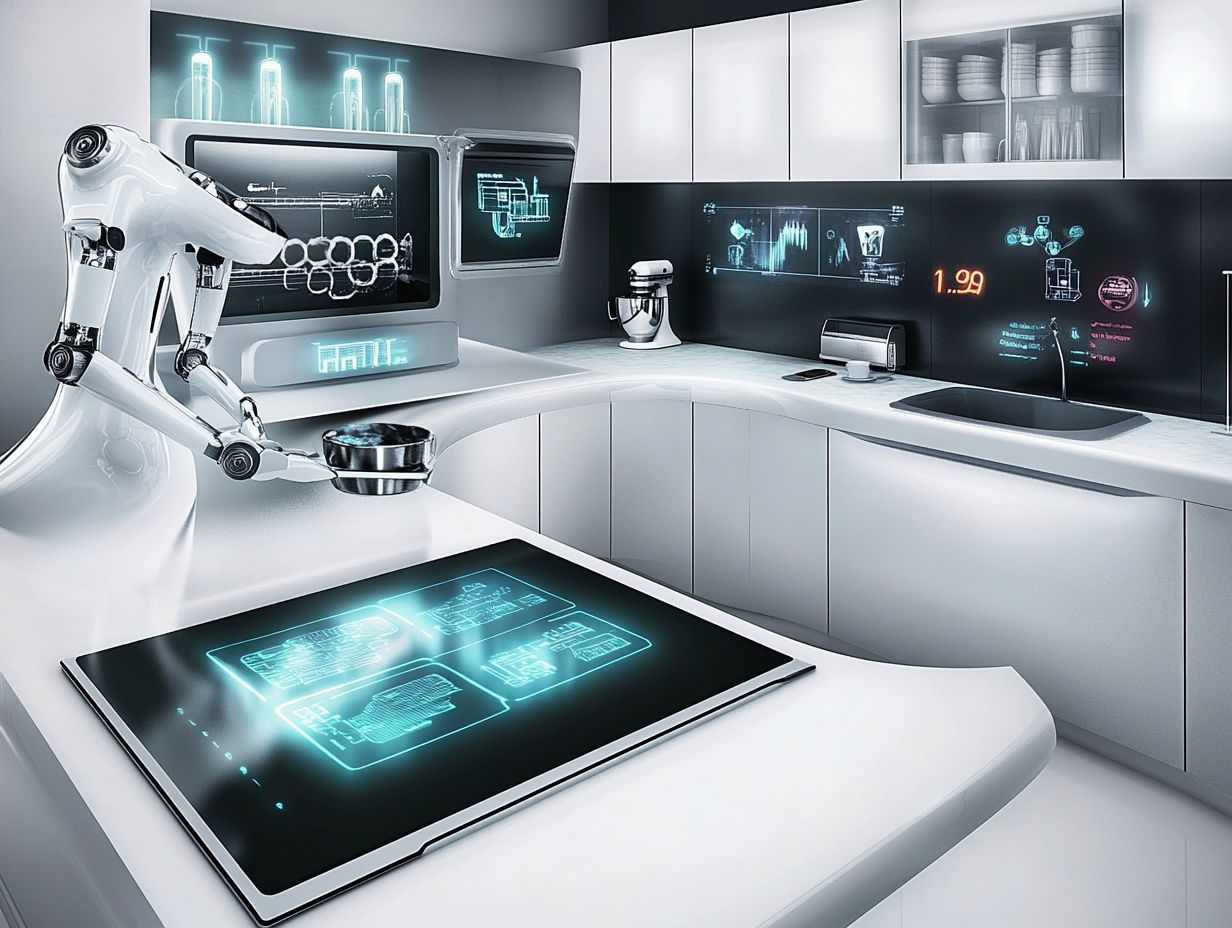
Investing in smart materials can lead to significant cost savings over time. This is especially true when considering how well smart appliances work, which improves energy management.
By reducing energy consumption, these materials help lower your utility bills and create a more sustainable kitchen environment.
Take smart ovens, for example. Ovens with advanced insulation can save you up to 30% more energy than traditional models.
With shorter cooking times and less need for preheating, these ovens drastically cut your electricity expenses.
Smart refrigerators that use phase change materials help maintain optimal temperatures while using less energy. This can reduce your energy bills by as much as 25%.
When you invest in these innovative appliances, you enjoy immediate financial benefits and lay the groundwork for long-term savings. This includes decreased maintenance costs and a longer lifespan for your devices.
Examples of Smart Materials in the Kitchen
Consider how smart materials enhance your kitchen’s functionality and user experience.
Imagine energy-efficient appliances made with innovative materials and self-cleaning surfaces that significantly cut down on maintenance.
The integration of smart materials with your kitchen gadgets transforms your culinary space into a more efficient and enjoyable haven.
Self-Cleaning Surfaces
Self-cleaning surfaces offer a groundbreaking way to reduce maintenance while boosting hygiene and aesthetics.
These surfaces use advanced coatings that repel dirt and stains, making upkeep much easier for you.
They often include nano-coatings, which are tiny layers that prevent liquids and grime from sticking.
From countertops to backsplashes, these surfaces maintain cleanliness and enhance your kitchen design.
The benefits are especially appealing for modern households, improving overall kitchen efficiency and contributing to a healthier environment.
By using these advanced materials, you can find innovative solutions that simplify your daily chores while creating a sleek, stylish look that reflects contemporary design.
Energy-Efficient Appliances
Energy-efficient appliances from brands like Bosch and Thermador show how smart materials can transform cooking technology.
These appliances are designed with you in mind! They reduce energy consumption without sacrificing performance, enabling you to cook effectively.
With features like advanced induction cooktops and energy-efficient ovens, these brands enhance heat distribution and retention.
This means quicker cooking times and less energy use.
For instance, induction technology heats your pots and pans directly, minimizing heat loss and allowing for precise temperature control—all while saving electricity.
Smart sensors in dishwashers optimize water and energy use, making cleanup easy and eco-friendly.
When you embrace these technologies, you’ll enjoy a seamless blend of functionality, sustainability, and convenience in your cooking routines.
How to Incorporate Smart Materials in Your Kitchen
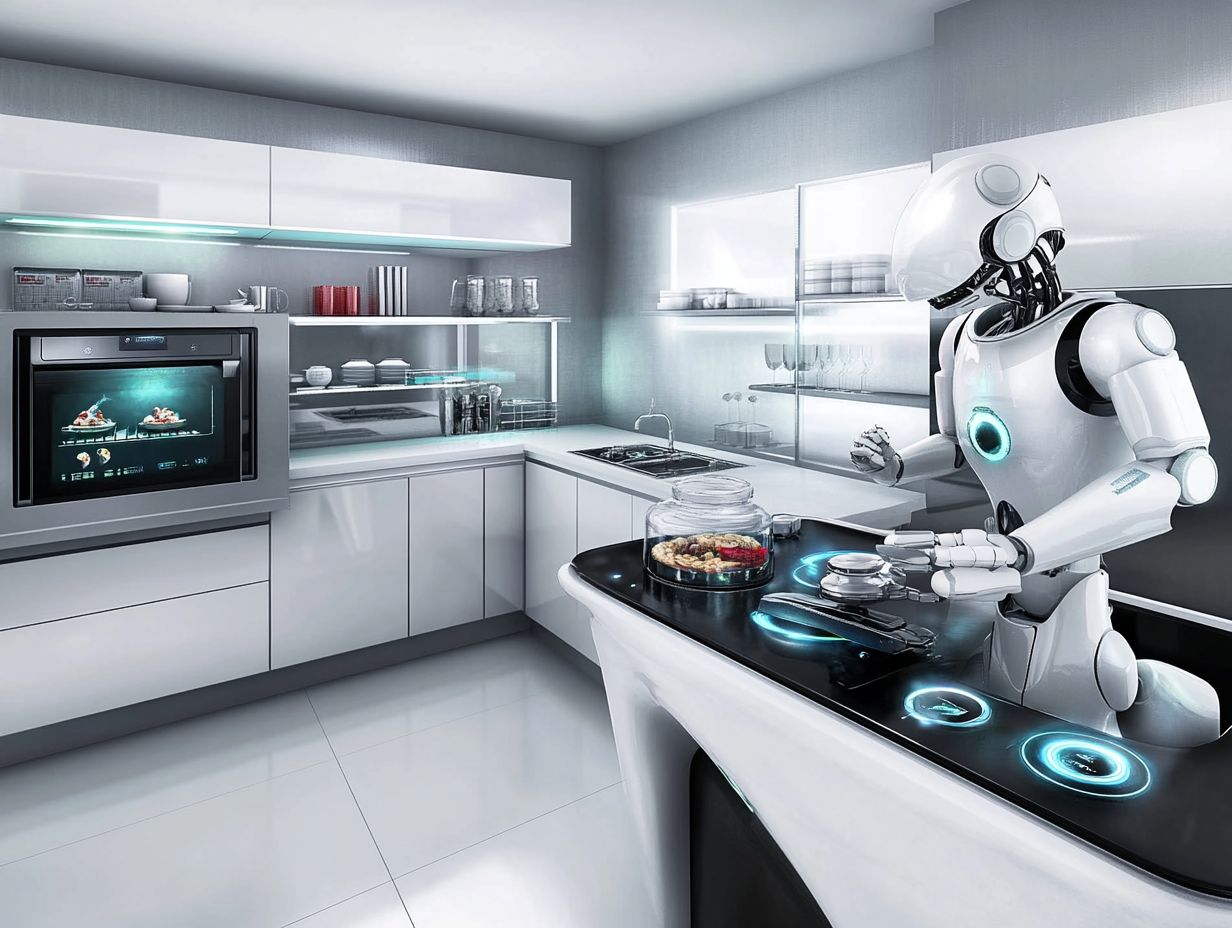
Incorporating smart materials into your kitchen requires careful planning and design to achieve optimal functionality and style.
By choosing the right materials that fit your cooking needs and kitchen layout, you can create a modern culinary space that is efficient, stylish, and equipped with the latest technology.
Explore how you can upgrade your kitchen with these amazing smart materials today!
Practical Tips and Considerations
Incorporating smart materials into your kitchen design can elevate both functionality and aesthetics. By selecting the right smart appliances, you set the stage for an optimized culinary experience.
It’s crucial to check how these new materials will work with your current appliances. This ensures seamless compatibility and avoids any conflicts.
Opting for smart countertops that integrate effortlessly with your connected devices can enhance functionality while preserving a cohesive design.
By aligning your choice of smart materials with contemporary kitchen trends—be it minimalism or sustainability—you create a harmonious atmosphere. Don’t overlook the long-term maintenance costs.
Investing in durable, low-maintenance smart materials can save you time and money. This enhances both convenience and visual appeal in your kitchen.
Future of Smart Materials in the Kitchen
The future of smart materials in your kitchen holds remarkable advancements. These innovations are set to enhance the connected kitchen experience and elevate your culinary skills.
With continuous research and development, you can anticipate technologies that boost functionality and revolutionize how you interact with cooking.
Advancements and Potential Impact on Daily Life
Advancements in smart materials are set to transform your daily life, especially in cooking and kitchen organization. As these materials evolve, expect groundbreaking technologies that simplify food preparation and elevate your overall experience.
Picture a kitchen with surfaces that clean themselves or utensils that adjust their temperature based on the food you’re preparing. These innovations could make meal prep more efficient and safer.
Imagine smart packaging that keeps an eye on your food’s freshness and suggests recipes based on what’s on hand. This functionality saves you time and promotes healthier eating habits.
Frequently Asked Questions
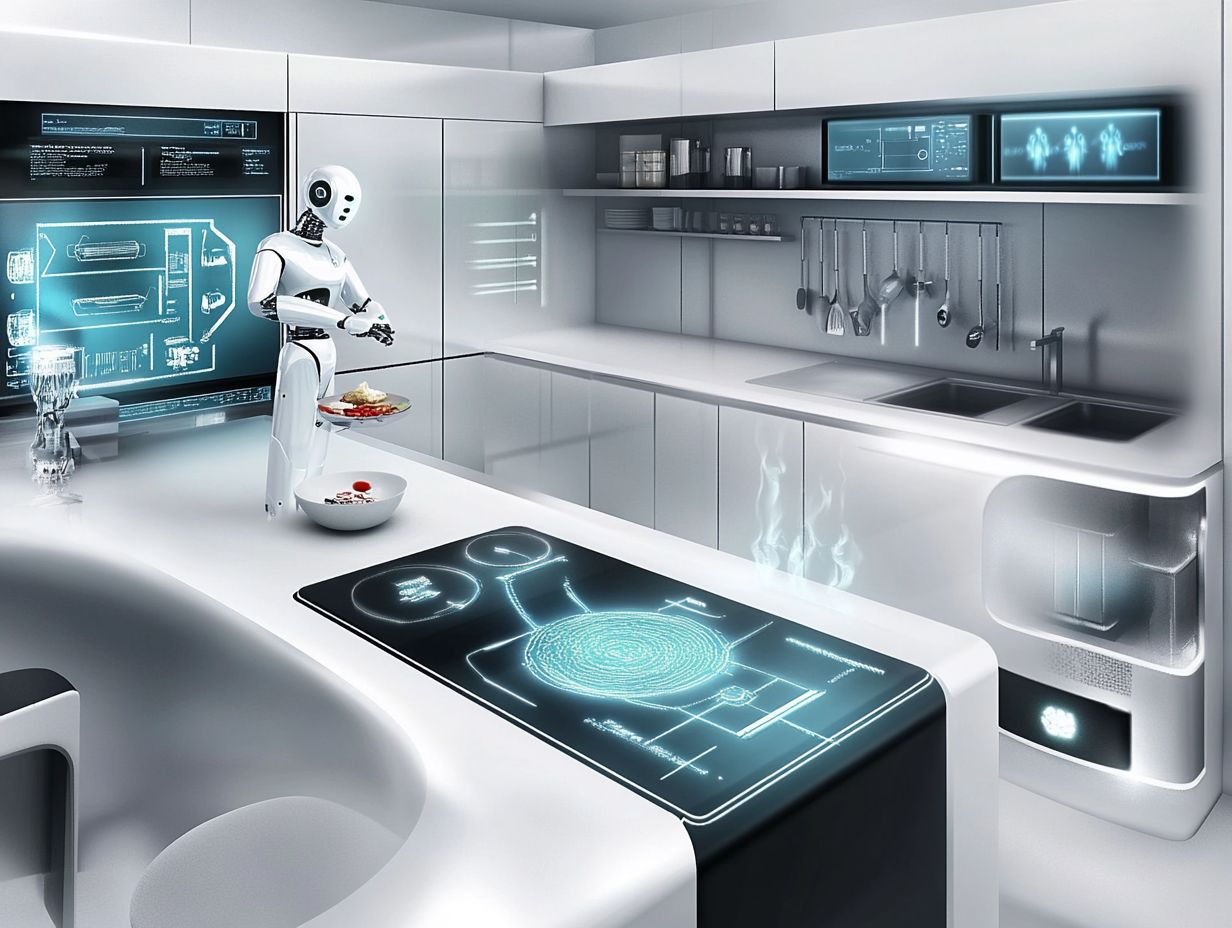
What are smart materials and how are they used in a high-tech kitchen?
Smart materials change their properties in response to heat, light, or electricity. In a high-tech kitchen, they enable self-cleaning surfaces and energy-efficient appliances.
What are the benefits of using smart materials in a high-tech kitchen?
Using smart materials can reduce energy consumption and increase efficiency. They also enhance the overall functionality of the kitchen, saving you time and money on maintenance.
What types of smart materials are commonly used in a high-tech kitchen?
Common types include shape memory alloys, thermochromic and electrochromic materials, and self-healing materials. Each has unique properties suitable for different applications.
How do shape memory alloys work in a high-tech kitchen?
Shape memory alloys change shape in response to temperature changes. In kitchens, they can improve energy efficiency in appliances like refrigerators and ovens.
Can smart materials be used to improve food safety in a high-tech kitchen?
Yes, they can significantly improve food safety. For instance, antimicrobial surfaces prevent harmful bacteria growth, and embedded sensors monitor food freshness and temperature.
Are there any disadvantages to using smart materials in a high-tech kitchen?
Smart materials come with many benefits, but it’s essential to think about the downsides. They can be more expensive than traditional materials, which may raise the total cost of your high-tech kitchen.
Some smart materials may also need regular maintenance or replacement. This can take time and may lead to higher costs over the long run.
